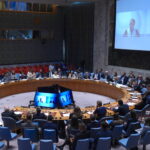Rep. Madeleine Dean described the Gaza Humanitarian Foundation as a ‘death trap for starving Palestinians’

DIRK WAEM/BELGA MAG/AFP via Getty Images
The UNRWA logo is seen on the vest of an employee during a visit to the Jabal El Hussein refugee camp of UNRWA, , part of a diplomatic mission to Israel and the Palestinian territories, in Amman, Jordan, Wednesday 15 May 2024.
Democratic members of the House Appropriations Committee criticized Republican-led efforts to dismantle the United Nations Relief and Works Agency in the House’s draft 2026 budget bill for the State Department and other foreign programs.
The exchanges underscore the continued support among some prominent Democrats for restoring the U.S. relationship with the scandal-plagued UNRWA, more than a year after U.S. aid to the group was first halted following allegations that UNRWA staff participated in the Oct. 7, 2023 attacks on Israel. The budget bill includes a continued ban on aid to the agency and calls on the State Department to put together a plan to replace it.
Rep. Rosa DeLauro (D-CT), the top Democrat on the committee, pushed for the restoration of support to UNRWA.
“The bill scapegoats our international partners, U.N. agencies and NGOs that deliver life saving aid to the most vulnerable people around the globe,” DeLauro said. “Organizations like UNRWA will be destroyed, leaving children and families in Gaza and other places around the world to starve and to die.”
DeLauro also pushed back on provisions in the bill that would withhold funding from the U.N. Secretariat until the U.N. and U.S. government take certain steps to pursue accountability for UNRWA members involved in the Oct. 7 attacks.
“I do not believe the language matches the intent,” she argued. “The provision is overly broad. It penalizes important U.N. entities until specific actions are taken by the United States government. This makes no sense.”
She argued that a provision demanding that the U.N. waive immunity for U.N. employees involved in the attack is unnecessary.
“U.N. immunity is already waived in cases where it would impede the course of justice or where someone has committed human rights violations or engaged in or supported acts of terrorism,” DeLauro said. “We all want justice for the horrific attacks on both Americans and our friends in Israel and indeed, the Justice Department has a task force already investigating this issue. We should work together to address this in a manner that achieves true justice.”
Reps. Madeleine Dean (D-PA) and Bonnie Watson Coleman (D-NJ) introduced an amendment that would halt future U.S. aid to the Gaza Humanitarian Foundation until the State Department transmits to Congress all evidence provided by Israel and all U.S. assessments about the diversion of United Nations humanitarian aid by Hamas in Gaza.
It would also require the State Department to report to Congress on deaths at or near GHF distribution sites and plans to minimize such deaths, as well as on fraud and antiterrorism safeguards, before any further aid is provided to the GHF.
Dean accused the GHF of “violating core humanitarian principles” and described the system as a “death trap for starving Palestinians,” urging the U.S. to return to previous U.N. and NGO-run distribution systems.
She said she’s been shown no proof that Hamas had diverted aid provided under previous distribution systems, though she said that it “could be” doing so.
Dean claimed that “not a single refugee was gunned down as they attempted desperately to retrieve aid for their family with UNRWA or [the] World Food [Program] or other U.N. programs” and alleged that “more than 1,000 Gazans have been killed — shot and killed — by the IDF by trying to simply get food” at GHF sites. Israel has denied claims that it is targeting aid recipients at GHF sites, and some reports of such activity have been disproven.
Dean withdrew her amendment without requesting a vote.
Dean and Watson Coleman introduced another amendment to encourage the State Department to continue to support the East Jerusalem Hospital Network, which the committee rejected by a party line 35-26 vote.
Rep. Mario Díaz-Balart (R-FL) argued against the amendment, saying that no provisions of law would otherwise prohibit aid to the hospital network and that the decision should be left to Secretary of State Marco Rubio to assess where and how humanitarian funding would be best spent.
As part of an amendment package, committee Republicans called for an additional $2 million to be provided in the coming year for the implementation, enforcement and renewal of sanctions on Iran.
The amendment package also included language expressing concern about the Muslim Brotherhood, and requesting a report to Congress on how the State Department is countering “the threats posed” by the group, including visa restrictions.
The amendment package was adopted by a 34-27 vote.
Democrats more broadly criticized Republicans for the significant cuts the bill would enact on the State Department and U.S. foreign aid programs formerly run through the U.S. Agency for International Development.
The report requires additional vetting for U.S. funding abroad, targeting the BDS movement and alleged U.S. support for political activity

Kevin Carter/Getty Images
The U.S. Capitol Building is seen at sunset on May 31, 2025 in Washington, DC.
Republicans on the House Appropriations Committee’s National Security, Department of State and Related Programs subcommittee are backing a significant increase in funding for the office of the State Department’s special envoy to monitor and combat antisemitism.
The explanatory report accompanying the subcommittee’s 2026 funding bill, which it advanced last week, proposes $2.5 million for the office, up from the $1.75 million provided in 2024 and 2025. The report also includes language calling for increased full-time staff in the office. The full Appropriations Committee will meet to discuss and vote on the bill on Wednesday.
The bill also expands vetting policies for U.S. funding abroad, requiring that no funding be provided to organizations that engage in the Boycott, Divestment and Sanctions movement targeting Israel, glorify violence or target the U.S. or Israel at the International Criminal Court or International Court of Justice.
Citing unspecified allegations that the U.S. provided assistance to organizations involved in political activity — a potential reference to GOP allegations that the U.S. funded protests against the Israeli government — the report directs the Department of State to expand its vetting procedures “to include an assessment of political neutrality and a review of statements by individuals or organizations that constitute engagement in political advocacy, incitement, or support for terrorism that would cause operational and reputational risks for the United States Government.”
The legislation, as approved by the subcommittee last week, would cut off U.S. funding to various United Nations initiatives, including the U.N.’s general budget.
The report explains that the cuts were motivated in part by the U.N.’s failure to address internal antisemitism and anti-Israel bias. It requests that the State Department report to Congress on the issue, including specific instances of antisemitism and their origins, statements by U.N. agencies or officials that may violate their responsibility to maintain neutrality toward Israel and an assessment of the U.N.’s plan to improve its response to antisemitism.
It also “strongly condemns” the U.N. General Assembly for passing a resolution granting the Palestinian Authority status nearly equivalent to that of a member state, describing the decision as having “undermin[ed] peace and security between the Israeli and Palestinian peoples.”
The report states that lawmakers are concerned about the continued relationship between Hamas and Turkey, which has hosted some of the group’s leaders. It makes no mention of the similar — and deeper — relationship between Hamas and Qatar.
The report calls for accountability for the United Nations Relief and Works Agency, including demanding that the U.N. address atrocities committed by UNRWA members on Oct. 7, 2023, and UNRWA’s alleged provision of support for and partnership with terrorist groups.
It demands that the U.N. provide unredacted files on these issues, which it has allegedly declined to do thus far, and asks the State Department to present a plan for aiding the Middle East without UNRWA and a report on whether U.S. aid to UNRWA was diverted to or paid the salaries of terrorist groups and their members.
The bill would block U.S. funding to South Africa unless it meets several conditions, including ceasing its cooperation with U.S. adversaries.
It would earmark $5 million for programs in Israel designed to support archeological and cultural heritage, like the City of David. It also urges the State Department to support programs and organizations that back the U.S.-Israel relationship and directs the department to make funding available for humanitarian needs in Israel, such as medical responses to Iranian missile attacks.
It would maintain funding, $50 million annually, for the Middle East Partnership for Peace Act and would provide $50 million for the Middle East Partnership Initiative, which aims to support leadership and public-private partnerships in the Middle East; $10 million for the Middle East Regional Cooperation program, which funds scientific collaboration between Israel and Arab States; and $4 million for cooperative development programs between Israel and the United States in third countries.
The report states that freeing the remaining hostages in Gaza “is a critical United States priority and urges regional partners and allies to intensify their efforts toward achieving this objective.”
The legislation creates new oversight requirements for U.S. aid to Syria, requiring the State Department to notify Congress about aid provided to Syria, to consult with Congress before initiating a new aid program or activity and to ensure that no U.S. aid will benefit members or affiliates of the former Assad regime.
The report expresses concern about antisemitic discrimination in Latin America, “particularly instances of elected leaders fueling prejudice against Jewish communities through social media and official government channels or otherwise neglecting their responsibility,” and encourages them to condemn and work to fight antisemitism.
The report also instructs the State Department to work with U.S. allies toward implementing snapback of United Nations sanctions on Iran.
It also asks the State Department to report to Congress on foreign governments and nonstate actors that are targeting the international Jewish community and using antisemitism and antisemitic symbols.
The report requests that the State Department update Congress on the status of negotiations with the PA to end its terror payments program and expresses support for continued efforts to dismantle Hamas in Gaza, stating that the group continues to pose a threat to the U.S., Israel and other partners.
It further mandates that the State Department update Congress on the situation in southern Lebanon, including the actions of Hezbollah, the Lebanese Armed Forces and the U.N. peacekeeping force and their actions to comply with and enforce U.N. Security Council Resolution 1701 and the Israel-Lebanon ceasefire agreement, which mandates the disarmament of Hezbollah.
And it directs the State Department to present a plan for the future of the U.S.-Egypt relationship, including to consider negotiating a memorandum of understanding between the two countries on security assistance, as the U.S. has in place with Israel.
The report additionally instructs the State Department to ensure sufficient resources are provided to support the Abraham Accords and their expansion, and to work to expand membership in the Comprehensive Security Integration and Prosperity Agreement with Bahrain.
British rap duo Bob Vylan was slated to perform in 19 U.S. cities this fall

Ben Birchall/PA Images via Getty Images
Bob Vylan performing on the West Holts Stage, during the Glastonbury Festival at Worthy Farm in Somerset.
The members of the British rap duo Bob Vylan had their visas revoked by the State Department on Monday ahead of a planned U.S. tour after leading chants calling for “death to the IDF” over the weekend at the Glastonbury music festival in the U.K.
“The Department of Justice Task Force to Combat Antisemitism will work with the U.S. State Department to deny entry into the United States of performers who incite violent antisemitic behavior,” a spokesperson for the DOJ told Jewish Insider.
“Foreigners who glorify violence and hatred are not welcome visitors to our country,” Deputy Secretary of State Christopher Landau wrote on X.
Bob Vylan was slated to perform in 19 U.S. cities this fall. Organizers of the annual Glastonbury festival — Britain’s biggest summer music festival — said on Sunday they were “appalled” by the chants.
Irish rap group Kneecap, which had their visas revoked in April, also performed at the festival on Saturday despite one of its members having been charged with a terror offense for displaying a Hezbollah flag at a London concert.
The visa revocation comes amid a broader effort by the Trump administration to crack down on the explosion of antisemitism in the U.S, with several recent high-profile cases of student visa cancellations.
Plus, U.S. pours cold water on Macron’s Palestinian summit

ANDREW CABALLERO-REYNOLDS/POOL/AFP via Getty Images
State Department Sikorsky HH-60L Black Hawk helicopters as they fly over Baghdad towards the U.S. embassy headquarters on December 13, 2024.
Good Thursday morning.
In today’s Daily Kickoff, we talk to analysts about the significance of the evacuation of some State Department personnel and military families from the Middle East and the likelihood of a military strike on Iran’s nuclear sites. We report on the defeat of two resolutions in the Senate yesterday to stop weapon sales to Qatar and the UAE, and cover comments by Defense Secretary Pete Hegseth on the status of the Qatari luxury jet gift. We talk to GOP senators about French President Emmanuel Macron’s campaign for international recognition of a Palestinian state, examine the findings of a new Quinnipiac poll that illustrates deepening partisanship over Israel, and have the scoop on a push by the Orthodox Union calling on the Senate to pass the Educational Choice for Children Act. Also in today’s Daily Kickoff: Van Jones, Rev. Johnnie Moore and Rabbi Abraham Cooper.
What We’re Watching
- The House Appropriations Committee will conduct its full committee markup of the 2026 defense and homeland security funding bills.
- The House Armed Services Committee will hold a hearing on the Department of Defense’s 2026 budget request with Secretary of Defense Pete Hegseth and Chairman of the Joint Chiefs of Staff Gen. Dan Caine.
- The Senate Committee on Homeland Security & Governmental Affairs will hold a hearing on the nomination of Sean Plankey to be director of the Cybersecurity and Infrastructure Security Agency.
- The Zionist Organization of America is holding its annual legislative lobbying day at the Capitol.
- Argentine President Javier Milei is being presented with the Genesis Prize today at Jerusalem’s Museum of Tolerance.
What You Should Know
A QUICK WORD WITH JI’S LAHAV HARKOV
Since the Israeli strike on Iran’s air defenses in October, Jerusalem has sought a green light, or something close to it, from Washington to strike the Islamic Republic’s nuclear sites. President Donald Trump, however, repeatedly told Israel to hold off as he pursued a diplomatic agreement with Tehran to stop its enrichment program.
Now, after the Iranian nuclear program has continued apace and Trump has voiced frustration over Tehran’s intransigence, it seems that Jerusalem’s patience for diplomacy is running out.
Israeli Strategic Affairs Minister Ron Dermer and Mossad chief David Barnea will be meeting Trump’s top negotiator Steve Witkoff on Friday ahead of the sixth round of talks with Iran in Oman on Sunday “in an additional attempt to clarify Israel’s stance,” an official in Jerusalem said, amid persistent reports and strong indications that Israel is prepared to strike Iran.
After a call with Israeli Prime Minister Netanyahu last week, Trump said that if Tehran does not agree to give up uranium enrichment, the situation will get “very, very dire.” On Wednesday, Secretary of Defense Pete Hegseth said that “there have been plenty of indications” that Iran is moving towards weaponization of its nuclear program, and Gen. Michael “Erik” Kurilla, the chief of CENTCOM, said that he presented Trump and Hegseth with numerous options to attack Iran if nuclear talks break down.
Hours later, the State Department began to move some personnel out of Iraq and the military suggested that servicemembers’ families depart the Middle East, while the U.K. warned about a potential “escalation of military activity” in the region. Such evacuations are often the first step to reduce risk ahead of a large-scale military operation.
Trump told reporters that the evacuations are happening because the Middle East “could be a dangerous place, and we’ll see what happens.” More on this from Jewish Insider’s Marc Rod here.
Kurilla postponed his testimony before the Senate planned for Thursday. Staff at U.S. embassies and consulates throughout the Middle East were told to take safety precautions, and those stationed in Israel were told not to leave the Tel Aviv metropolitan area, Jerusalem or Beersheva.
Multiple news outlets published reports citing anonymous American officials that Israel is ready to strike Iran without help from the U.S. One possible reason for the timing — moving forward even as Washington and Tehran are set to enter a sixth round of talks on Sunday — is that Iran has reportedly begun to rebuild the air defenses that Israel destroyed last year. Iranian Armed Forces Chief of Staff Mohammad Bagheri reportedly said last month: “We are witnessing a remarkable improvement in the capability and readiness of the country’s air defense.”
PARIS PUSHBACK
GOP senators criticize France’s Macron for defying U.S. with Palestinian statehood push

French President Emmanuel Macron’s campaign for international recognition of a Palestinian state and championing of an upcoming United Nations conference on the subject despite U.S. opposition has received a frosty reception from Senate Republicans, Jewish Insider’s Emily Jacobs reports. France is set to co-chair “The High Level International Conference for the Peaceful Settlement of the Question of Palestine and the Implementation of the Two-State Solution” with Saudi Arabia at the U.N. headquarters in New York next week. Several senators described it as a distraction from U.S. efforts to secure peace in the region while praising the Trump administration’s decision to urge U.N. member states against participating.
Republican reactions: “It certainly sounds like they take us for granted and think that they can act without consequence. France has a long history of doing this in foreign policy. They’re consistently a problem and have been forever, but I’d say it’s very unhelpful of them at this present moment,” Sen. Josh Hawley (R-MO) told JI. “They’ve generally had a cozy relationship with Iran that is purely driven by economic ties, maybe some historic ties. It makes no sense to me. I don’t think it’s well received by our administration,” Sen. Thom Tillis (R-NC) said.
Read the full story here with additional comments from Sens. John Kennedy (R-LA), Lindsey Graham (R-SC) and Markwayne Mullin (R-OK).









































































